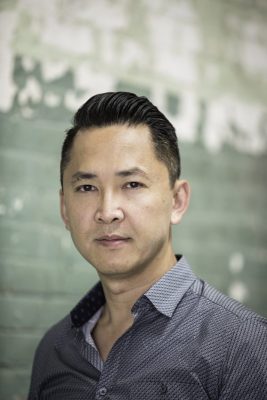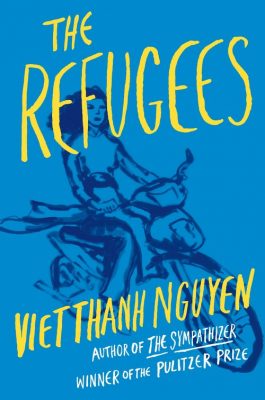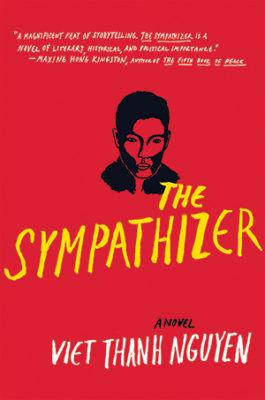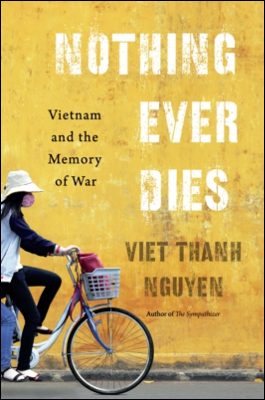Beverly Parayno interviews Viet Thanh Nguyen about refugees, the Vietnamese community, and Nguyen’s books in this article for Rumpus.

When I first learned that Pulitzer Prize-winning author Viet Thanh Nguyen and I shared the same hometown of San Jose, California, and that we both grew up there in the 1970s and ‘80s, I knew I had to talk to him. Immediately I thought about the year that a large wave of Vietnamese students entered my middle school nestled at the bottom of Mount Hamilton in the Evergreen area of East San Jose. Could we have crossed paths?
That part of San Jose, at the time, still clung to its history as a farming community— fruit stands selling Bing cherries, horses trotting around on farms along Quimby Road, acres of walnut orchards along White Road, and old, dilapidated barns filled with bats like the one near our school that we used to play in. In this setting, new tract homes went up and housed many Filipino immigrant families like mine. Just a few miles away, the birth of Silicon Valley was underway with the emergence of semiconductor companies.
It turns out that Nguyen didn’t live in my area, but several miles away in a grittier, urban setting in downtown San Jose (we learned that we were neighbors later in the mid-1980s when his parents eventually moved to the Evergreen area; by then, farms and orchards had been replaced by condos and more tract homes). Still, our conversation gave me insight into what it was like for the Vietnamese refugees at the time.
For as much as the immigrant Filipino community was struggling to make ends meet, we had one advantage—our parents had chosen to come to the US for a better life and more opportunities. As Nguyen reminds us, the reader, in his latest collection The Refugees (Grove Press), the Vietnamese community fled Vietnam under great political duress and eventually ended up in San Jose and in California.
In his collection, Nguyen deals with themes of trauma, loss, love, family, identity, including sexual identity, in the Vietnamese refugee community. Of the eight stories that make up the collection, “War Years” left the deepest impression on me. This story, based on Nguyen’s own family experience, depicts the tension that builds within the Vietnamese refugee community as characters struggle to rebuild their lives while dealing with the aftermath of the war. Partially set near Story Road in East San Jose, Nguyen’s descriptions of the “lowriders with chrome rims” and a “garage transformed into a storefront with sliding glass” gave me an exhilarating feeling and a nostalgia for place that I expect someone from, say, Washington DC might feel when reading Edward P. Jones’s Lost in the City or readers in Ireland might experience in James Joyce’s Dubliners.
Nguyen and I talked on the phone over the holidays about his struggles growing up in San Jose, his frustration with the short story form, and secondhand memories—traumatic memories passed down from one generation to the next.
***
The Rumpus: When I first contacted you for an interview to discuss, in part, our shared hometown of San Jose, you replied, “Sure, I’m making peace with it.” What did you mean by this?
Viet Thanh Nguyen: I grew up in San Jose in the 1980s, so it was quite difficult for me to separate my feelings about San Jose from all these feelings I had about my childhood and adolescence. These feelings were also wrapped up with being the child of refugee parents who were struggling to survive as shopkeepers in downtown San Jose. Our shop, one of the first Vietnamese markets, was on East Santa Clara Street and we lived on South Tenth Street, two doors from the 280 freeway entrance ramp.
I was witnessing what was happening with my family and the Vietnamese refugee community, who were also struggling to establish themselves and dealing with the legacy of the war.
Also, I was an only child because my brother had gone off to college by the time I was eleven. These feelings of being lonely and isolated, and watching the emotional difficulties of my parents and of the Vietnamese community, all come back to what San Jose means.
By the time I graduated from high school in 1988, I just couldn’t wait to leave San Jose. It just felt really constricting to me. It took me at least a couple of decades before I even felt comfortable going back there.

Rumpus: Was the Vietnamese community supportive of each other at that time?
Nguyen: The Vietnamese community did support each other. They formed churches and community networks, and families helped each other out. Vietnamese people place a great emphasis on loyalty, family bonds, community, and hospitality. All of that was wonderful about the Vietnamese community.
But at the same time, the Vietnamese community, being so intimate with each other, were also the people who knew where the weak spots were. Living in the Vietnamese community meant that you could also be subjected to rumors, betrayals, suspicions. There were anti-communist feelings—that was a consequence of the war—and it was very difficult to speak out in any way or deviate from whatever was the consensus in the community.
During the 1980s, it was a very difficult time for the Vietnamese community because there was a lot of violence, whether it was spousal abuse, child abuse, or the phenomenon of home invasions, where Vietnamese youth in gangs were assaulting Vietnamese people in their homes and robbing them. That was a very real phenomenon. So, to answer your question, to be in the Vietnamese community was both to be supported and also to be threatened at the same time.
Rumpus: One of the reasons I really wanted to talk to you is because I remember quite a large wave of Vietnamese students coming into Quimby Oak Junior High School in the Evergreen area of East San Jose in 1980, when I was in seventh grade. Before that, in my elementary school, there had been a handful of Asian Americans—a few Filipinos like me and at least one Japanese student—so the influx of Vietnamese students the following year in junior high was quite noticeable to me.
Looking back now, I feel guilty that our student body, including me and my friends, didn’t really socialize with the new Vietnamese students. We were busy being middle-schoolers, worrying about things like make up and boys. The Vietnamese students seemed sort of invisible, even in the classrooms, and I don’t recall any real efforts by the teachers or administration to help acculturate them.
So, fast forward thirty six years later, I’d like to ask what schools you went to and what your experiences were like there. Were you able to fit in?
Nguyen: After The Sympathizer was published, people emailed me or wrote to me saying that they remember this time when Vietnamese people were coming to the United States, and that they were living next to these people, taking the bus with them, and had no idea what these people had gone through. They still didn’t thirty years later. That was part of what I had felt growing up in San Jose—that I was deeply immersed in the Vietnamese community and knew the negative stories of what the people had been through, and was also distinctly aware that no one else outside the Vietnamese community knew very much about these experiences.
People rarely asked questions about what the Vietnamese had gone through, and if they did ask questions and the Vietnamese people told them, it would be very awkward. How are you supposed to respond to these horrible stories that people had about what the war was like and about being a refugee? It was an assertion even among Vietnamese people that it would be very difficult to tell our stories to non-Vietnamese people.
I moved to San Jose in 1978 from Harrisburg, Pennsylvania, and went to a couple of public elementary schools initially, Horace Mann and Lowell on South Seventh Street. It was difficult being a Vietnamese refugee. I got into my first fist-fight at Horace Mann. At Lowell, there were many more Vietnamese students there and we had gangs in the second and third grade! They weren’t real gangs but the boys were already splitting themselves off in factions and fighting each other. It was a very violent place. You needed to form a community, even if it was one community of Vietnamese people against another community of Vietnamese people, you had to have your own band of people protecting you. That impulse was very strong at all levels of the Vietnamese community, whether it was with the adults or the children.
In fifth grade, my parents, who are deeply Catholic, sent me to St. Patrick School on East Santa Clara Street. That was when everything changed. There were Asians, a lot of Filipinos, for example, but there was not the possibility of forming a Vietnamese ethnic community in these Catholic schools. So as a Vietnamese person I had to assimilate the best way I could.
By the time I got to high school at Bellarmine College Preparatory, which is a very white school, there were Asian American students there but we separated ourselves off. We knew we were different but we didn’t know how. We would have lunch together and call ourselves the “Asian Invasion” or “The Yellow Peril.” That was the extent of our political consciousness. It wasn’t until I went to UC Berkeley that I actually figured out that we were Asian Americans, and that’s why we felt different from those people and maybe were treated differently.

Rumpus: Let’s talk about your new collection The Refugees. In the story “Fatherland,” you set up a compelling and complicated situation where the character Mrs. Ly flees with her three children after her husband, Mr. Ly, was forcibly relocated by the Vietnamese communist government as part of the New Economic Zone program. Mr. Ly then marries his mistress and names his second set of children after the first set. How did you come up with this scenario?
Nguyen: That’s a true story. I met a Vietnamese American woman about my age who told me that this is what her father had done. It’s not surprising to me. It’s ritually symbolic of so many things in terms of our political history, our war history, and our cultural patterns within the Vietnamese community. It’s very believable that a man would have two families, and that someone would be so melancholic that they would name one set of children after a set of children that left. This premise has a lot of potential for encapsulating a great deal of Vietnamese history and feeling in one family story.
Rumpus: In an interview with CBC Radio, you talk about the degradation of the term ‘boat people,’ how it is demeaning, how it relegates refugees to an abject status, and how, in response to this, you really wanted to show the complexities of Vietnamese life in your writing and allow readers to see what it’s like to be a refugee. Is there a story or character in the collection that most embodies these complexities?
Nguyen: Each of these stories tackle the different aspects of what it means to be a refugee, but the autobiographical story “War Years” is the story in the collection that most condenses that refugee experience. It melds the narrative of one family with the politics and the trauma of the war and of fleeing the country and leaving people behind. What I did in that story was bring together events that were located across a broad spectrum of time in my family’s life and condensed them all into a few days.
This story shows how the refugee experience impacted people but in disparate ways. Both of the women in the story are trying to survive, but Mrs. Hoa is taking her loss out on other people. That was very typical in the Vietnamese refugee community either through actions against people suspected of communist sympathies, through blackmailing, which did happen, from what I was told, or through other kinds of intra-Vietnamese violence and antagonism that were taking place. The Vietnamese people could not take out their feelings on white people because they knew that there was a boundary they couldn’t cross, so they turned against each other emotionally and, often times, physically. And that’s one of the consequences of what it meant to be a refugee: the community internalized its trauma and took it out on each other.
Rumpus: In “Someone Else Besides You,” what interested you in writing about a character like Thomas, who is somewhat lost and passive and under the control of a violent father?
Nguyen: The collection as a whole is very interested in issues of gender and gender roles, so in that particular story, I was interested in masculinity and the relationship between father and son. I have seen a lot of these types of domineering father figures, whether they were military men or not, in the Vietnamese community, and I have seen a lot of these Vietnamese or Asian American men who seemed emasculated or lost or ineffectual. I wanted to explore those kinds of subjectivities, the tensions between these two competing models of masculinity and the difficulties in relating between fathers and sons who have such different attitudes about what it is men should be or what men should do.
Rumpus: I’d like to ask about your writing process. In an interview with Charlie Rose, you talk about how writing your novel The Sympathizers was a great pleasure—it only took you two years—but that the story collection was a big struggle and a horrible experience. Why was the collection so difficult, and were there particular stories that were more challenging to write than others?
Nguyen: I started writing fiction seriously in graduate school and I chose the short story form because that was the kind of form that was being taught in writing workshops. I also thought they should be easier to write than a novel. I’ve always wanted to write a novel ever since I got to college, but I thought I would start off with short stories. But writing short stories was actually muchmore difficult than I ever thought they would be. By the time I figured this out, it was too late. I was trying to write a short story collection and I was stubborn, I didn’t want to just give it up and move on to a novel.
I started seriously working on that short story collection when I was twenty-six. In the summer between graduating from my doctoral program and starting my job at USC as a professor, I wrote an entire short story collection. It was a terrible short story collection. It was a lot of words. I thought, ‘Okay, I did that, so it can’t be that hard. What I’ll do is, I’m going to get tenure and after I get tenure I’m going to focus primarily on writing fiction. I’m just going to knock out this revised short story collection in a couple years and I’ll be famous.’
And so what happened was I got tenure on time and took off for two years to Paris, Saigon, and Provincetown to finish that short story collection. And it was absolutely miserable because I realized I wasn’t as talented as I thought I was. That really began a period of intense misery for probably the next decade of my life as I struggled with the short story collection.
The most difficult story was “Black Eyed Woman.” I wrote the first draft of that story in 1997 and didn’t finish it until 2014 after fifty drafts. That story just terrified me. It was a really difficult one because I just didn’t understand the form of the short story. I still don’t understand it. I don’t have an intuitive graph of it.
I was also a writer who wanted to say a lot about politics and history, and I did not know how to do that in the context of a short story or a short story collection. No one was teaching me how to do it (that’s a whole separate issue about form and politics) so I had to figure out how to do it myself. And even after I finished the short story collection, I felt no love for the form because writing the novel felt more natural to me. The short story still feels like an alien art. I’m just relieved with having gotten done with it. I don’t want to go back to it.
Rumpus: So there’s no second collection?
Nguyen: [Laughs] No.
Rumpus: Are your parents supportive of your writing?
Nguyen: My parents are supportive in a passive way; maybe “tolerant” would be a better way of putting it. They never opposed me being a writer, but that’s also because I never talked about being a writer with them as a subject of conversation. Every now and then I will come home and say, “Here’s a story that’s been translated into Vietnamese,” or when I have books, I’ll bring them the books. But we don’t talk about the content of those works.
For my father, the major issue is the political sensitivity of these works and how dangerous they are to the family. For example, when I wrote Nothing Ever Dies: Vietnam and the Memory of War, I said to him that I wanted to dedicate this book to you and mom, and I need to know how you want your names to appear, because they changed their names legally and there are also different ways to arrange Vietnamese names in Vietnam versus in the United States. He said, “Don’t put our names in it because that history [of the war] is not over.” So the dedication of the book is to my father and mother but their names are not there.
The flip-side to that though is, when The Sympathizer won the Pulitzer Prize, my dad was ecstatic. He rarely gets happy. For him the significance of books are purely about their social significance but not necessarily about the subjects of the books.

Rumpus: You fled Vietnam at a very young age and therefore remember almost nothing of the country. But as a refugee, you grew up with secondhand memories of Vietnam and the war. This really resonates with me as a first generation Filipina who grew up hearing stories of the Japanese occupation of the Philippines during World War II as told to me by my parents and grandparents. How real are these secondhand memories for you?
Nguyen: My parents told me certain stories about their life in Vietnam, but they didn’t tell me everything. But what they did tell me, they told me repetitively because a story had an impact on them for a number of reasons. Very fragmentary memories have become a part of me—that’s what it means for them to become secondhand. I don’t have a very good grasp of the details. But because they’ve been relayed to me, they become a part of me. And the way I know that is because these memories have left emotional residue in me. There are times where I’ll find myself talking about the past and feel myself caught up in emotion because of the legacy of these secondhand memories and the feelings that they’ve created.
I’ve heard from other Vietnamese American readers of The Sympathizer that they experienced this too but even more so than me. A Vietnamese American woman from San Jose said she has experienced PTSD from these secondhand memories even though she hasn’t experienced them herself. This woman tells me she found it really hard to get through the novel because the scenes in the book would bring up too much emotion for her, even though she was even younger than I am. The feelings that the parents have felt in the first generation were so intense that they left a deep imprint on the second generation.
Rumpus: What are your thoughts about the current plight of Syrian refugees?
Nguyen: It’s always been important for me to assert that I’m a refugee and not an immigrant. A segment of the Vietnamese community has been successful, so it’s easy to forget we are in fact people who fled from somewhere in order to come here. It’s easy for Americans to forget this history of how it is that they feared the presence of Vietnamese refugees.
And to think that Syrian refugees are a new kind of problem that the United States and other Western countries can’t deal with is wrong. We do have more capacity to absorb many more refugees from Syria and other places than we are currently doing. There is both a moral and political obligation given the history of the United States and Europe in shaping the Middle East. It’s also part of the obligation of refugees who have been lucky enough to survive a refugee experience like the Vietnamese people have to extend that empathy to newer refugees.


